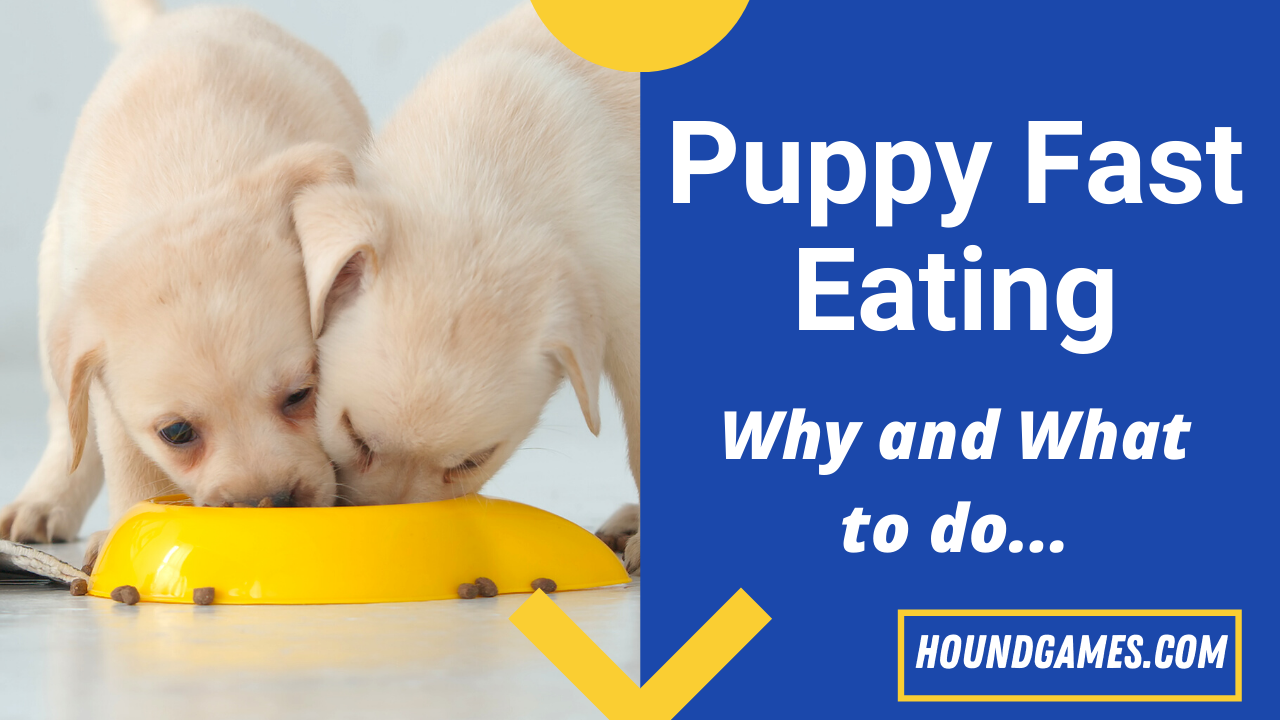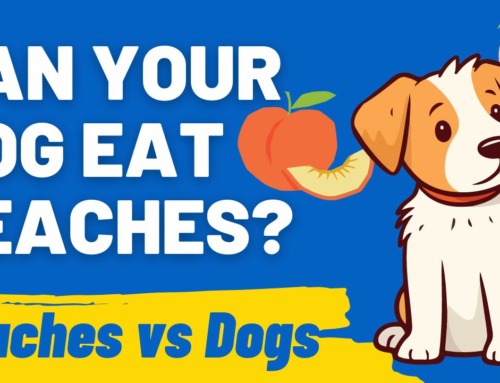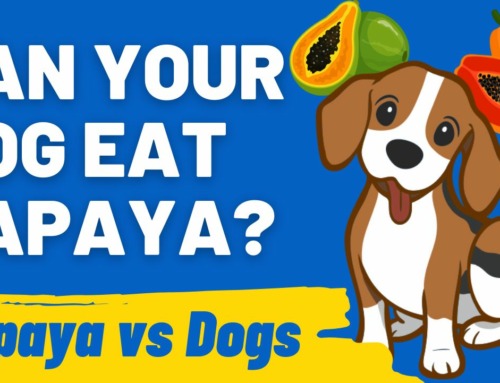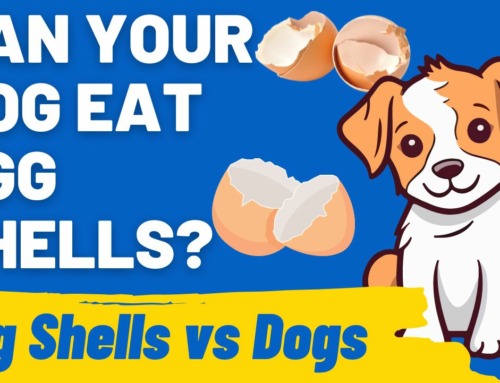Does your puppy eat as if they’re starving? Have you spotted them swallowing their food whole, or even throwing up afterward? Why do dogs eat too fast and swallow their food whole? In this article, we explore why your puppy swallows their food without chewing and discuss options for what you can do.
Why do puppies swallow food without chewing?
The sight of your puppy swallowing their food whole can be alarming. And it can be dangerous if they choke. Here are a few reasons why your puppy is inhaling their food:
Instinct can cause fast-eating puppies
While it’s easy to assume your puppy is hungry, the behavior traces back to their natural instincts. Dogs eat what they get when they live in a pack, depending on their place in the hierarchy.
Eating fast can mean the difference between life and death since ancestral dogs could never be sure when the next meal was coming.
Another factor is that dogs are pack animals, and often are part of a litter that competes for access to their mother’s milk. This continues onto when they transition to kibble.
This means that from birth, a puppy must try to get as much food as possible and eat it as quickly as possible.
Physiology in fast eating
Dogs are also physically capable of swallowing chunks of food with less risk of choking. That is because their throat can expand to accommodate larger chunks, which ties into their teeth.
Both dogs and humans are omnivorous. Yet when we compare a dog’s teeth to a human’s, we notice a few key differences. We both have incisors, canine teeth, premolars, and molars. However, their shapes are very different.
The shape and layout of their teeth make it difficult for dogs to grind their food up the way we do, as they are essentially carnivore teeth.
This means it makes more sense for them to swallow large chunks quickly rather than slow chewing on food like sheep or a cow would.
Environmental stresses
A puppy going into a new home will have added environmental stresses that can exacerbate fast eating behaviors.
If a dog is suddenly eating quicker than they were, have you introduced a new pet into the home recently, such as a cat or puppy?
One would think that the most likely response would be increased aggression. But many dogs opt instead for either guarding their food or trying to gobble it all down as fast as they can.
Feeling a need to compete, or feeling anxious in general can cause food resource guarding in dogs. This can lead them to eat faster.
For advice on how to deal with resource guarding you can read this article which focuses on Border Collies, but many of the principles apply to resource guarding in general.
If resource guarding is associated with fear aggression or anxiety aggression, you can also read this article.

Is it okay for puppies to swallow food without chewing?
Surprisingly, for the most part, dogs are perfectly fine swallowing their food whole. However, there are times when it can cause problems. This will depend on what they are eating, how fast they are eating, and whether they are stopping to tear food into smaller pieces.
If your puppy is fast eating, then chew toys and bones, or other toys can become hazardous. A puppy can eat something that can cause an obstruction in their stomach, or be a choking hazard.
There is also an important distinction between eating whole food and eating too fast.
Swallowing large chunks of food too fast presents a choking hazard, and this is where you want to intervene. If you know your puppy is a fast eater and doesn’t pause to tear large food into smaller pieces, then it’s vital to know how to help a choking dog.
Can you train a dog to chew their food before swallowing?
No traditional training works to reliably slow a dog’s eating down. However, that does not mean there aren’t measures you can take.
These measures involve feeding your puppy with specifically designed dog food bowls or food dispensers.
You may have heard that spreading your dog’s food out on a large flat surface (such as a floor) is a great way to address the problem. For some owners, throwing the food across a large, flat surface, like the kitchen forces the dog to eat slower as their food is spread out.
This does work but is not always practical or hygienic, and it can give resource guarders a much bigger area to show aggression over.
Special feeders are a more practical plan of action. There are all sorts of options on the market, but they come down to two categories.
The first are slow feeders, where food gets dispensed in preset intervals. It is as simple as not allowing your puppy enough food at a time to have enough to gulp down.
This option works but is not ideal for those who keep their dogs on a fixed feeding routine. The quality and design of the slow feeder is also important. Many dogs work out how to flip a cheap slow feeder over to spill all the food out at once, making the feeder obsolete.
Then there are bowls and feeding accessories that make it harder for your puppy to get to their food. For example, you may have seen bowls with a donut-shaped hollowing.
This type of feeder makes it harder for your dog to gulp their food down because they have to eat around the protrusion in the middle of their food bowl.
Other options usually take the form of a large ball or cube. The idea is that you fill them up with food for your dog, who then has to roll them for food to escape from small holes in the feeder. Unfortunately, they are sometimes impractical and pretty messy.
You might wish to read, Do Puppies Eat a Lot? (What You Need to Know)
Or perhaps this one, Dog Panting Heavily After Eating Bone, Bully Stick, Rawhide: Why?
Puppy swallows kibble without chewing
While it may be concerning, puppies swallowing kibble without chewing is usually nothing to worry about. This is so long as they are not gulping down huge portions of kibble at once.
If the kibble is too big for a small dog or puppy to swallow whole, you are likely feeding them the wrong kibble. Therefore, make sure that the size of the pellets is appropriate for the size of your dog.
A puppy who has not yet properly transitioned from soft food to hard kibble may also be more at risk of choking and will need supervision.
Monitor your puppy for choking or regurgitating undigested food during their feeding. This is likely a sign that your dog is eating too much and requires a slow feeder.
Puppy swallows food without chewing
It’s one thing to see a fully grown dog chow down on their food, swallowing whole chunks with ease. It’s an entirely different thing to watch your fragile little puppy swallow bigger chunks of food than should rightly fit in their mouth!
It would help if you kept in mind that puppies are exceptionally competitive by nature. In nature, there is a biological imperative for them to outcompete their siblings. Unfortunately, it often means the difference between life and death for wild animals.
Puppies are pretty much all instinct. They haven’t learned that they need not compete so hard. Therefore, when most puppies first adapt to eating solids, it can look like a school of ravenous piranha descending upon the feeders.
The most important thing is that you make sure your puppy is eating age-appropriate foods. That means foods that are not a choking hazard.
Their diet should also reflect their teething and physical ability to chew softer foods in the early stages of their development.
Your puppy should not have access to food that poses any serious risk if they do swallow it whole. However, if they are eating too fast, you need to invest in an appropriate feeder.

Puppy is eating so fast they throw up
As we’ve learned, the problem is less with dogs not chewing and more with them eating too fast. If they eat too fast, they may well eat too much, which can cause them to regurgitate undigested food.
This is not the same as vomiting, where there is usually a medical condition accompanied by gagging and heaving. In vomiting, food is much more digested and can be clear foam by the time it leaves the body.
On the other hand, regurgitation is the stomach clearing space because too much was ingested too fast. The simple answer is to limit your puppy’s portions.
When a dog eats too fast, they tend to swallow a lot of air. This is concerning to many owners who believe that swallowing air can lead to bloat, a potentially life-threatening condition.
However, there is little scientific evidence to support that eating too fast causes bloat. The only nutritional evidence we have for measures against bloat (which older, large breed dogs are more at risk for) are:
-
Feeding a varied diet
-
Feeding at least twice a day
-
Make sure fats and oils are not among the first four or five ingredients on the food label
What to do about puppies eating without chewing
The only good solution to the problem of eating without chewing and eating too fast is a proper slow feeder. These come in different shapes but are all aimed at making it harder for your dog to get to their food.
We think the best choice on the market is this Outward Hound Fun Feeder. Choose the 2 cup choice for your puppy and you can’t go wrong.
Kong puppy toys are also a good choice to slow feed your puppy. Freezing your dog’s daily food in KONG toys can also be a great way to both slow down how they eat, and keep them busy for extended periods.
We also recommend our Hide’n’Treat puzzle toys, which have a large enough food cavity to give your dog their requirements, while giving them a mental workout at the same time!
Sources
https://www.akc.org/expert-advice/advice/4-ways-to-slow-your-dogs-eating/
https://www.hillspet.com/dog-care/nutrition-feeding/why-does-my-dog-eat-so-fast
https://www.animalbehaviorcollege.com/blog/health/how-to-stop-a-dog-from-eating-too-fast/




